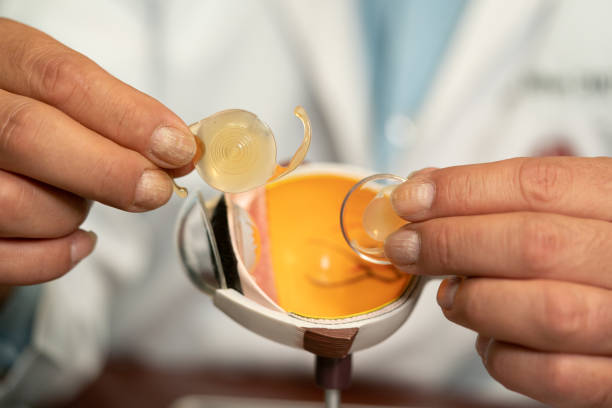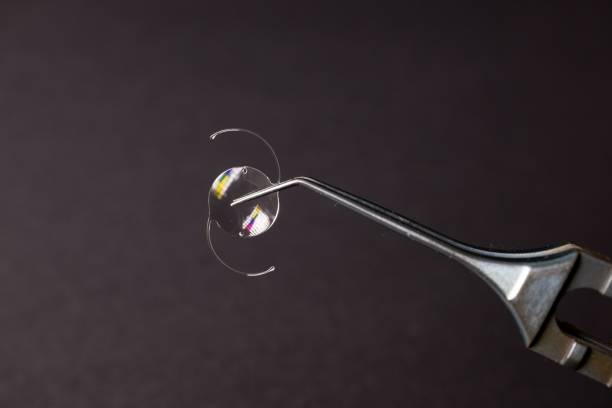What Are Implantable Lenses?
If you’re tired of relying on glasses or have been told you’re not a good match for LASIK surgery, implantable lenses may be the perfect solution. Also called Phakic Intraocular Lenses (Phakic IOLs), these advanced lenses offer a modern and effective way to correct your vision. Unlike LASIK and other laser procedures that reshape your cornea, implantable lenses are placed inside your eye to improve how you see.
Think of implantable lenses like permanent contact lenses that stay in place. They sit behind your iris (the colored part of your eye) and in front of your natural lens. Once inserted, these lenses help sharpen your vision—so you can see clearly without needing glasses or daily contacts. Many people enjoy the benefit of clearer sight and greater freedom from eyewear after the procedure.
How Do Implantable Lenses Work?
Implantable lenses improve your vision by bending light so it focuses properly on your retina. This is important because your retina is what sends clear images to your brain. If you have severe nearsightedness (myopia), your eyeball may be too long. This causes light to focus in front of the retina instead of directly on it, making distant objects look blurry.
The implantable lens helps fix this problem. Once placed inside your eye, it changes the way light enters and travels through your eye. By adjusting the light’s path, the lens helps focus it exactly where it should go—on your retina. This allows you to see more clearly, even at a distance, without needing glasses or contacts.
There are two main types of Phakic IOLs (implantable lenses):
- Visian ICL (Implantable Collamer Lens)
- Verisyse Lens
Both types of implantable lenses—such as EVO ICL and other Phakic IOLs—work in a similar way by helping light focus correctly in your eye. However, your eye doctor will decide which type is best for your personal vision needs. They will look at several factors, including the shape of your eye, your prescription strength, and how much correction you need. This helps ensure you get the best possible results from your vision correction procedure.

Benefits of Implantable Lenses
Many people opt for implantable lenses because of their clear and lasting benefits. Here are some of the top advantages that make them a great choice:
Sharp, high-definition vision: Implantable lenses deliver clear, crisp, and high-definition vision. Many people notice an immediate improvement in how they see, which can lead to a better daily experience and overall quality of life.
Ideal for people with high prescriptions: If you have a strong prescription for glasses or contact lenses, implantable lenses may be an excellent choice. They are designed to handle more extreme levels of nearsightedness (myopia), where other vision correction methods might not work as well.
No removal required, unlike contact lenses: Once the lenses are implanted, there’s no need to remove or clean them. Unlike contact lenses, they stay in place permanently, offering a convenient and low-maintenance solution for clear vision.
Reversible, unlike LASIK: One of the key benefits of implantable lenses is that they are reversible. If needed, your eye doctor can remove or replace them—unlike LASIK surgery, which makes permanent changes to your cornea.
Quick procedure: The procedure is simple and fast, usually taking only 20 to 30 minutes per eye. Most patients are in and out the same day, making this a convenient option for those with busy schedules.
Fast recovery: Many patients report improved vision within just 24 hours after surgery. Recovery is typically smooth and quick, allowing you to get back to your routine with better vision in no time.
With all these benefits, implantable lenses can be a life-changing option for people who want clear vision without the daily hassle of glasses or contact lenses. They offer a long-term solution that brings freedom, convenience, and improved eyesight—helping you see the world more clearly every day.
Are You a Good Candidate?
Implantable lenses are an excellent choice for many people. You might be a good candidate if you:
- Are between 21 and 45 years old
- Have had stable vision for at least a year
- Struggle with very high levels of nearsightedness
- Have thin corneas or dry eyes, making LASIK not a good option
- Are in overall good health
However, implantable lenses may not be suitable if you have:
- Cataracts
- Glaucoma
- Diabetes with eye complications
- Autoimmune diseases
It’s important to speak with your eye doctor to determine if implantable lenses are right for you. A thorough eye exam will help ensure that your eyes are healthy enough for the procedure. Your doctor will assess your unique situation and guide you toward the best vision correction option.

The Procedure: What to Expect
The process is fast and safe. Here’s what you can expect:
Before Surgery:
- Your eye doctor will measure your eyes
- You may be asked to stop wearing contacts for a few weeks
- Eye drops will be used before surgery
During Surgery:
- You are awake but your eyes will be numbed
- A tiny incision is made in your eye
- The lens is folded and inserted, then it opens inside your eye
After Surgery:
- You’ll go home the same day
- Most people return to normal activities in 1-2 days
- Full healing takes a few weeks
Your doctor will give you eye drops and schedule follow-up visits to check your progress.
Cost of Implantable Lenses
Implantable lenses typically cost more than LASIK surgery. The price can range from $3,000 to $5,000 per eye, depending on several factors, including:
- The type of lens: Different lenses may have varying costs based on the technology and materials used.
- Your surgeon’s fees: The experience and reputation of your surgeon can influence the overall cost of the procedure.
- Where you live: Prices may vary depending on your location and the cost of healthcare services in your area.
Since implantable lenses are considered an elective procedure, most insurance plans do not cover the cost. However, some clinics offer financing options or payment plans, making it easier to manage the cost over time. Be sure to check with your provider about available options to help with financing your treatment.
Comparing Implantable Lenses vs. LASIK
Implantable Lenses
- Ideal for people with severe nearsightedness: These lenses are designed to correct high levels of myopia, offering clear vision for those who struggle with strong prescriptions.
- A great option for those with thin corneas or dry eyes: If you’re not a good candidate for LASIK surgery due to corneal thickness or chronic dry eyes, implantable lenses can be a safe and effective alternative.
- Reversible, meaning the lenses can be removed if necessary: Unlike LASIK, this vision correction method is not permanent. If needed, your doctor can remove or replace the lenses, making it a flexible and low-risk option.
LASIK
- Best for people with mild to moderate vision prescriptions: LASIK works well for those with lower levels of nearsightedness, farsightedness, or astigmatism, offering quick and lasting vision correction.
- Offers a faster recovery time compared to implantable lenses: Most people see clearly within a day or two, making LASIK one of the fastest vision correction procedures available.
- Causes permanent changes to the cornea, which cannot be reversed: LASIK reshapes the surface of your cornea using a laser. Once done, these changes are permanent and cannot be undone, which may not be ideal for everyone.
If LASIK isn’t the right option for you, implantable lenses could be the best alternative for correcting your vision. Speak with your eye doctor to explore which procedure is most suitable for your eye health and needs.
Life After Surgery
After getting implantable lenses, most people experience clearer, sharper vision with little to no need for glasses. With improved vision, you can:
- Drive safely with better clarity
- Read comfortably without straining or squinting
- Enjoy outdoor sports and activities without the hassle of glasses or contacts
For many people, this is a life-changing improvement in their quality of life.
To ensure the best results and protect your eye health, be sure to:
- Attend all follow-up appointments with your eye doctor
- Use your prescribed eye drops as directed
- Wear sunglasses to protect your eyes from harmful UV rays when outdoors
Your eye doctor may also recommend regular check-ups to monitor the health of your eyes and ensure your vision stays clear and healthy over time.

Final Thoughts
Implantable lenses are a great option for people who want clear vision without the daily routine of wearing glasses or the permanent changes that come with laser eye surgery. They are especially helpful for those with high prescriptions or anyone searching for a long-term way to correct poor vision. These lenses offer freedom from glasses and contacts while delivering sharp, lasting results.
If you’re considering implantable lenses, the first step is to speak with your eye care provider. A full eye exam is needed to see if you’re a good candidate and to make sure your eyes are healthy for the procedure. With expert advice and proper care, sharper vision could be just around the corner.
Ready to See the World Clearly?
Don’t let glasses or contact lenses hold you back from living life to the fullest. If you’re curious about how implantable lenses can improve your vision, now is a great time to explore your options. This advanced vision correction solution could help you enjoy clear sight without the hassle of daily eyewear.
Take the next step by scheduling a consultation with your eye doctor. They can help you decide if this long-term option is right for your eyes and lifestyle. With implantable lenses, clear and lasting vision may be closer than you think!
Have questions or want to share your own journey with implantable lenses? Drop a comment below—we’d love to hear your thoughts and experiences!

